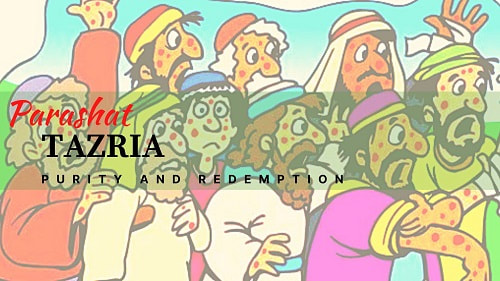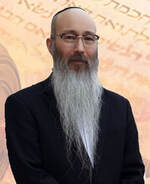|
By: HaRav Menashe Sasson Reporting from Jerusalem, Israel Published in the U.S.A. This week’s parashat, Tazria, and next week’s parashat, Mezora, discuss in great detail a number of ailments, skin conditions, and bodily emissions, and the role of the Kohanim in “diagnosing” these conditions. If a particular skin condition – zara’at [צרעת] – covers a person’s entire body, a Kohen is to declare the person to be “pure [טהר].” If, however, the skin condition covers less than the person’s entire body, a Kohen is to declare the person to be “impure [טמא].”
Vayyiqra 13:12-17. At first, one might think that a person who is only partially covered with zara’at [צרעת] might be deemed to be pure [טהר], and that someone whose body is fully covered with zara’at [צרעת] would be deemed to be impure [טמא]. However, as with so many things in the Torah, the truth, that is, reality, is exactly the opposite of what one might otherwise logically conclude. Many people who read about the laws of zara’at [צרעת] might find the study of these laws to be an interesting intellectual exercise, but then conclude that such laws have no practical, real-world application in today’s modern society. Such a conclusion, however, would be mistaken. In the Talmud, the Rabbis explain that redemption – the Mashiah – will come at one of two possible times: If the Jewish people “are deserving, [HaShem] will hasten [the time for the coming of Mashiah] [זכו אחישנה]”; but if the Jewish people “are not deserving, [redemption will come] in its time [לא זכו בעתה]. T.B., Maseket Sanhedrin 98a. The Talmud then elaborates, stating that: “[If] the Jewish people are deserving, [Mashiah will arrive swiftly], with the clouds of Heaven [זכו עם ענני שמיה],” but if the Jewish people “are not deserving, [Mashiah will come slowly, as] a humble man, riding on a donkey [לא זכו עינ ורוכב על חמור].” Id. In other words, it is up to us when Mashiah will come, and whether we want the redemption, as the saying goes, the easy way or the hard way. But, you might ask, what does the coming of Mashiah have to do with the laws of zara’at [צרעת], of purity [טהר] and impurity [טומאה]? The Talmud, referring to Parashat Mezora, Vayyiqra 13:13, explains:
T.B., Masekat Sanhedrin 97a. In other words, just as when zara’at [צרעת] covers only a portion of a person’s body, that person is impure [טמא], so too when only a portion of the world accepts the false beliefs of heretics, the world, as a whole, is likewise impure [טמא]. However, just as a person is pure [טהר] when his entire body is covered with zara’at [צרעת], so too, when the entire world has accepted false beliefs, the world will be pure [טהר] and thus ready for redemption. See, Rashi. Today’s world is certainly impure. One need only look at Western societies and so-called “civilizations” to see how the secular heretics are denying Torah principles. Likewise with Iran, which seeks nuclear weapons so it can destroy Israel; China, Russia, and all the other dictatorial regimes deny HaShem, which they must do to stay in power. By any “realistic” assessment of the world, we are taking the “hard way” to redemption, to Mashiah. But, as we learn from the Talmud, there is another way. The Midrash tells a story about an impoverished Kohen who lived in Eretz Yisra’el. Like so many of today’s Israelis, the Kohen decided to leave Eretz Yisra’el in order to attempt to improve his financial situation. However, before he could leave, the Kohen had to make arrangements for his “customers,” who would come to him for a “diagnosis” of purity [טהר] or impurity [טומאה], after they had contracted zara’at [צרעת]. Midrash Tanchuma, Tazaria 6. The Kohen taught his wife the basic principle of zara’at [צרעת] that “if the root of the hair is dry, know that it is smitten, as the Almighty gave the root of each hair its own well from which to draw water and, if the well dries up, so does the hair.” Id. The Kohen’s wife responded by saying, “If the Almighty gave the root of each hair its own well from which to draw sustenance, how much more it is true that you, a man who has countless hairs and whose children deserve their sustenance from you, will be granted sustenance from the Almighty?” Id. With that, the Kohen’s wife did not permit the Kohen to leave Eretz Yisra’el. The lesson the Kohen missed, but which his wife understood, is that HaShem is in control of the world, including all its details, right down to the root of each hair. If we have faith [אמונה] in HaShem, we will know and understand, as with all other things, that if we, the Jewish people, do our part, HaShem will respond in-kind. In other words, if we, the Jewish people, are deserving, Mashiah will arrive swiftly, with the clouds of Heaven [זכו עם ענני שמיה].” May we, as individuals and as a nation, turn toward, and draw close to, HaShem and become deserving of having Mashiah arrive swiftly, with the clouds of Heaven. שבת שלום Shabbat Shalom! Copyright © The Israel Foundation. All Rights Reserved.
0 Comments
Your comment will be posted after it is approved.
Leave a Reply. |
THE ISRAEL FOUNDATION





